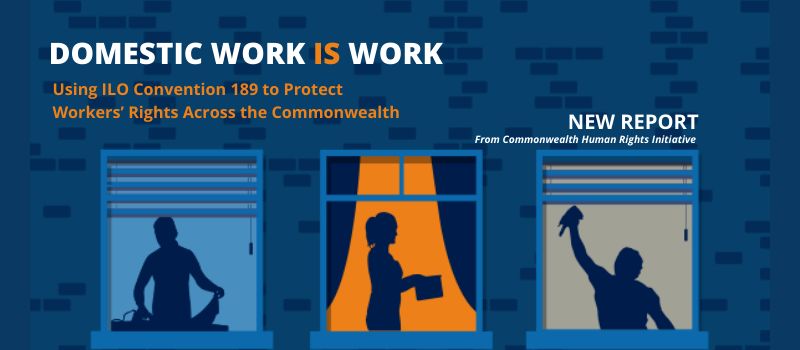Domestic Work is Work: Using ILO Convention 189 to Protect Workers Rights Across the Commonwealth
2021 marks the 10th anniversary of the Domestic Workers Convention (C189) - a landmark international treaty requiring decent work for domestic workers. The Commonwealth Human Rights Initiative, with support from the International Trade Union Confederation and the Commonwealth Trade Union Group, launched a report to inform good practice, inspire action, and raise awareness of the importance of ratifying C189.
The rights of domestic workers are under threat, now more than ever. The COVID-19 pandemic has demonstrated how vital care work is. Yet domestic workers – mostly women – have been among the hardest hit by the pandemic. It has impacted job security for millions of domestic workers, demonstrated their lack of access to social protections, and put them at greater risk of abuse, exploitation, and trafficking.

A Call to Action
Representing 2.4 billion people across 54 countries, the Commonwealth must lead on ratifying and implementing C189. However, only 6 of 54 Commonwealth countries have ratified and brought C189 into force to date. Despite low uptake, the Commonwealth has made recent strides. In 2021, four new countries ratified the Convention, three of which are members of the Commonwealth. We now need diverse voices and powerful coalitions to rise up, push for change, and hold our states to account.
About the Report
The report Domestic Work is Work explores the situation of domestic workers and the status of ratification of C189 in specific Commonwealth countries. It includes five Commonwealth nations that have yet to ratify C189: United Kingdom, Uganda, India, Papua New Guinea, and Dominica. These countries were selected because their governments have either committed to ratifying C189, are considering ratification, or face mounting local civil society pressure to ratify - all suggesting some momentum for change. Each case study focuses on the challenges facing domestic workers and explores actions that both governments and civil society can take to support domestic workers and promote C189.
This report also includes two additional case studies - countries that have shown their commitment to protecting the rights of domestic workers and advancing decent work for all by ratifying C189: Jamaica and South Africa. These stories of good practice provide insights into lessons learnt for effective civil society advocacy and government collaboration. The ratification stories of Jamaica and South Africa also exemplify the power of strategic grassroots advocacy for bringing about essential change.
|
Key Recommendations Civil society and advocates can take the following key actions to complement state actions and to promote the ratification of C189 and the rights of domestic workers in their countries:
|